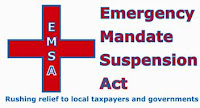 Rep. Sam Rohrer (R-Berks) has unveiled the Emergency Mandate Suspension Act (EMSA) to provide financial relief to school districts, counties and municipal governments struggling to pay for unfunded state mandates.
Rep. Sam Rohrer (R-Berks) has unveiled the Emergency Mandate Suspension Act (EMSA) to provide financial relief to school districts, counties and municipal governments struggling to pay for unfunded state mandates. "Essentially, if there is no money, there will be no mandate," Rohrer said at a Harrisburg news conference, flanked by members of groups representing local governments and school boards. "Local authorities would be given the option to opt out of expensive unfunded mandates. This is the fastest and most direct way that we can help school districts, local governments and the taxpayers who must fund them."
Under Rohrer's measure, if the state mandates a program but then fails to provide adequate funding to implement it, counties, municipalities and school boards would be able to temporarily opt out of the spending initiative.
Rohrer was joined Wednesday by representatives from the County Commissioners Association of Pennsylvania (CCAP), the Pennsylvania School Boards Association (PSBA), the Pennsylvania State Association of Boroughs and the Pennsylvania State Association of Township Supervisors, who all lent their support to Rohrer's legislation.
From a press release issued by Rohrer after the news conference:
According to the Pennsylvania Economy League, 45 of the 53 "third-class cities" in Pennsylvania can be categorized as "financially distressed." CCAP reports that an average of 60 percent of a county's budget is made up of directives from outside entities.Originally posted at TONY PHYRILLAS
"The burden of unfunded mandates is real and it is something that must be addressed," Rohrer said. "The old ostrich-head-in-the-sand approach is no longer an option. The governor and state Legislature cannot sit by and watch as more and more local governments and school boards are pushed over the cliff of financial distress. The problem is unfunded mandates and the solution is the Emergency Mandate Suspension Act."
Rohrer's legislation would empower local authorities to temporarily - for a period of up to five years - opt out of unfunded state mandates. The local authority would be permitted to suspend local payments for the qualifying programs.
In addition, the bill provides for a similar temporary suspension of reimbursable mandates. If the state fails to reimburse local authorities for a mandated program, the local authority could suspend local payments for it. This would apply to programs for which the state ordinarily provides adequate funding to cover costs but, for whatever reason, has failed to provide that funding. This provision would apply if the Commonwealth missed two consecutive payments - as happened recently in many instances due to the state budget stalemate.
"Too often, leaders in Harrisburg have adopted a law and passed the costs on to local leaders," Rohrer said. "They take credit for the idea but pass responsibility for funding it on to our local governments and school boards. It is time for elected leaders at all levels of government to acknowledge the economic consequences facing taxpayers. This bill does more than talk about the problem. It identifies and proposes a solution. Now, it's time for lawmakers in Harrisburg to roll up our sleeves to make this policy a reality."


No comments:
Post a Comment